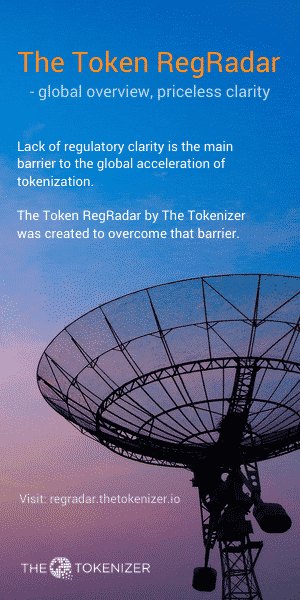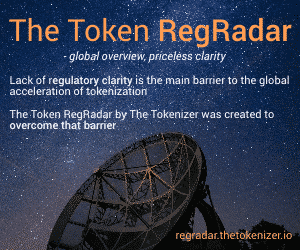Competing countries in the token economy
In the recent article One model to regulate all tokens, we explained the Container Token Model that plays a crucial role in the Liechtenstein token act, TVTG. However, one of the overall questions regarding the TVTG that still needs to be answered is how the Liechtenstein token approach differentiates from the approach of other token economy-leading countries in the same region – like Switzerland and Germany.
From the outside, it somehow seems as if these countries are currently competing for the role as the most progressive European jurisdiction of the token economy. And we want to ask not only Dr Thomas Dünser, Office for Financial Market Innovation, Principality of Liechtenstein, but also – in future articles – representatives from some of the other countries about regulatory differences and similarities – and about the nature of such a competition if it exists.
Question: In September 2020, the Swiss Parliament adopted the new regulations for Blockchain and Distributed Ledger Technology. In August, the German Federal Ministry of Justice and Consumer Protection and the Federal Ministry of Finance published a draft law introducing electronic securities. In the media, these drafts have been repeatedly compared to the Liechtenstein Blockchain Act (TVTG). Why is it that Liechtenstein has its own blockchain act, whereas Switzerland, for example, has chosen simply to adapt existing laws?
TD: The TVTG has a completely different focus: both Switzerland and Germany focus on the possibility of regulating digital securities, i.e. making these in some way legally possible. This is of great importance for the development of all blockchain applications in the securities sector. The actions of both countries show that this is primarily a civil law problem and only subsidiarily a securities and financial market’s law problem. Both countries, therefore, chose to supplement the existing securities regulations with DLT or blockchain-based securities or book-entry securities.

While Liechtenstein has already been familiar with the legal concept of uncertificated rights, the TVTG has now codified those uncertificated rights and thus created a statutory legal basis for digital securities. This has been achieved by amending the Persons and Companies Act (PGR). Specifically, it has now been clarified, as a matter of law, that from 1.1.2020 companies can issue not only physical securities but also book-entry securities for which no physical paper is required since a simple entry in a register (e.g. in a blockchain register) will suffice. It is worth mentioning that Liechtenstein’s book-entry securities law can be generated independently of technology, i.e. also without blockchain technology.
Q: Why do you need the remainder of the TVTG then?
TD: Uncertificated right tokens require basic civil law rules on legal transfer, acquisition in good faith, pledging, invalidation, etc. This could be introduced exclusively for this application. However, Liechtenstein has deliberately chosen a different approach and has defined these regulations in a separate law, the TVTG, which applies to all types of tokens. This means that not only cryptocurrencies, such as Bitcoin or Ether, and all security tokens are covered, but also all future blockchain applications in the overall economy (the so-called token economy). In these applications, for example, general rights to things are represented in tokens and used as the basis for a digital economy.
This can be, for example, a right to use a car, which can then be rented and paid for via a smart contract. The right to use a token then entitles the user to open the car and start the engine. Such applications have already been technically possible for quite some time. In practice, however, and especially in the area of mass applications, these applications have not yet arrived. Such developments are nonetheless only a matter of time. Accordingly, the Liechtenstein Government wanted to provide a sustainable legal basis for them. This is because these types of tokens require the same civil law regulations as digital securities. In contrast to digital securities, however, there is nothing comparable in existing law for general tokens. It has therefore been deemed more efficient to introduce a new civil law for all tokens at once.
Q: Why has Liechtenstein not adapted the existing rules on property law, as is proposed by Germany, for example?
Under its property law, Liechtenstein, like many countries, defines the civil law rules for possession and ownership, transfer, etc. of physical objects or real-estate. After thorough discussion, Liechtenstein decided not to declare property law applicable to all tokens. The law of property has a long-standing legal tradition, which refers to tangible fixtures and chattels and real-estate that require physicality. In practice, including judicature and legal academia, it would tend to increase legal uncertainty and prove to be unsuitable if it were interpreted and derived from property law. In particular, because the physicality which is essential to tangible fixtures and chattels is not present in a digital token – which is essentially electronically stored information. The creation of a special regulation in the form of a new civil law for tokens was, therefore, necessary from the government’s point of view and offered clear advantages in terms of legal clarity and legal security.
Another aspect which demonstrates the necessity and benefit of creating a separate civil law is the dichotomy between the “physical world” and the “digital world”, which is only just emerging with the token economy: While shareholder rights or digital currencies such as Bitcoin are already “virtual”, and so the problem of duality is not obvious, it becomes apparent when physical objects, such as paintings, cars, houses or bicycles, are tokenized. It is obvious that one cannot “digitize” a car, but only a right in relation to a car. However, several legal bases are needed to determine the rights to a car, such as contract law or property law. If the property right is represented by a token, it can theoretically and practically happen that another person owns the token as distinct from the actual car according to contract or property law. To be able to deal with such complications in the legal system, a dual structure is needed to be able to record and resolve such discrepancies legally. Hence, an independent civil law for tokens has also proved necessary to effectively and legally secure the synchronization of the physical and digital worlds.
Q: Why is the TVTG not called “Blockchain Act”?
TD: Laws/acts have to be formulated to be as technology-neutral as possible so that they do not become outdated within a couple of years, thereby increasing legal uncertainty. The starting point of the TVTG is therefore not the blockchain technology, but all technologies that allow information (i.e. tokens) to be owned and transmitted (digitally) without a central intermediary. The law describes this as “transaction systems based on trustworthy technologies (VT for “Vertrauenswürdige Technologie” in German)”.
With the TVTG, Liechtenstein has certainly created legislation that is somewhat ahead of current mass applications and will only unfold to its full effect in the coming years. However, the Government is confident that the token economy applications, and their full potential for the economy, can be realized more quickly through legal security that goes beyond cryptocurrencies and security tokens.
Q: Finally, is it true that there is an ongoing competition between token economy-friendly countries in Europe or perhaps globally? A simple reason could be that these countries have understood the potential value of attracting companies and investments from the blockchain industry and the security token industry that are likely to become massive within the coming years?
TD: From the perspective of Liechtenstein, there is no competition between token economy-friendly countries. There is instead a constructive dialogue about how to regulate the token economy going forward. With the token economy, we have the chance to foster a new form of a digital and worldwide economy with a high level of legal security and low transaction costs.
Given the de facto unbounded nature of blockchain systems, the token economy in practice, however, faces many cross-border challenges. As a member of the European Economic Area, Liechtenstein is interested in a token-economy-friendly European market which provides a high-level of legal security for all current and future applications. Until that is achieved, every step and approach of any country, even just addressing parts of the token economy constructively, has a positive effect on the overall development.
Image by meineresterampe from Pixabay
More articles about Liechtenstein:
Liechtenstein Parliament approves Blockchain Act unanimously
You Might also Like

1 Comment
-
Pingback: Competing countries in the token economy – Impuls Liechtenstein














